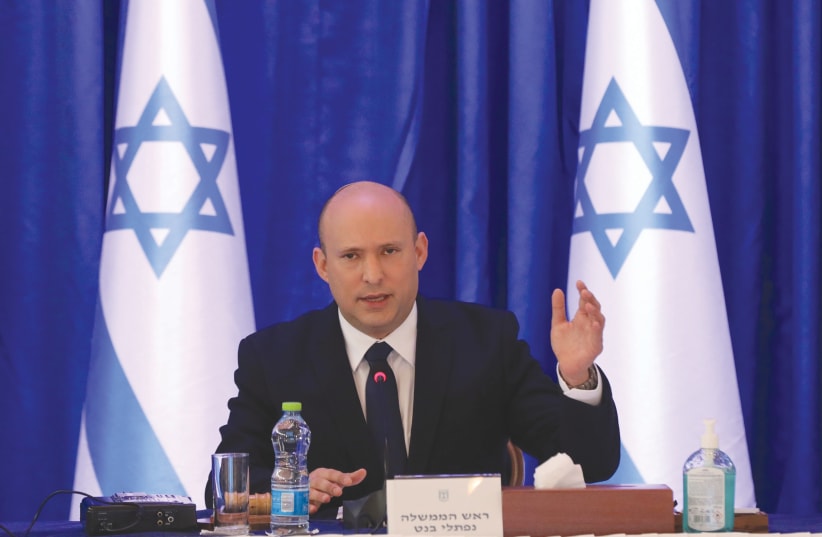‘Exhausting.” “Irksome.” “Nuisance.”
These are some of the words sources close to Prime Minister Naftali Bennett used in recent days to describe the persistence of those within the Israeli government and outside it to constantly bring up the issue of the Palestinians.
And the Palestinians are expected to be mostly absent from Bennett’s speech at the United Nations General Assembly on Monday.
Bennett has opposed a Palestinian state, on both ideological and national security grounds, consistently throughout his public life.
When he first ran for office, Bennett often said Israel has enough to offer so that its relations with the world should not revolve around the Palestinians.
In 2013, in his first term as an MK and minister, Bennett famously compared dealing with the Palestinian issue to a friend who has shrapnel in his behind, saying that the surgery to remove it would be worse than living with the shrapnel.
Foreign Minister Yair Lapid supports a two-state solution, a long-standing position as well.
When Bennett and Lapid formed a coalition together, they both said that no progress can be made on that front, but the government would take steps to improve the Palestinians’ quality of life.
But, of course, just because Bennett and Lapid say talks with the Palestinians are not in the cards doesn’t mean that everyone has to listen. Many of the statements by foreign leaders at their meetings with Bennett and Lapid included calls for a two-state solution. Whether Bennett was meeting with US President Joe Biden in the Oval Office or Egyptian President Abdel Fattah al-Sisi in Sharm e-Sheikh or King Abdullah in Amman – they all pushed the Palestinian issue.
Meanwhile, Defense Minister Benny Gantz and President Isaac Herzog seem to have an enthusiasm for Palestinian Authority President Mahmoud Abbas that has not been seen from Jerusalem in years, with the former meeting the rais in Ramallah and the latter speaking with him on the phone numerous times. Regional Cooperation Minister Esawi Frej has been encouraging Israeli ministers to meet with their Palestinian counterparts.
Lapid has said he is not seeking a meeting with Abbas, because the PA continues its suit against Israel in the International Criminal Court and its policy of paying terrorists who killed Israelis. However, he recently presented his plan to facilitate economic growth for Gaza in order to weaken Hamas and disincentivize terrorism. The endgame of his plan is to strengthen the Palestinian Authority toward an eventual two-state solution.
Of course, Bennett knew about all of these overtures to the Palestinians. He could have blocked the meetings and phone calls, an authority that his predecessor Benjamin Netanyahu exercised liberally, but he didn’t.
At the same time, the Gantz meeting was followed with a statement from the prime minister’s spokesman minimizing the event and saying it’s not a move toward peace talks, and Bennett’s office released a clarification after Lapid’s speech that Bennett supports the economic part of the plan, but not the two states part.
THOUGH THIS tension on the Palestinian issue is out in the open, Bennett believes that he can manage it, domestically and internationally, if he continues to make his unwavering stance against a Palestinian state known.
“People ask, why does [Bennett] say he won’t meet with Abbas and he opposes a Palestinian state?” a senior diplomatic source said. “He has to say it, because that’s what he believes in. If Lapid or Gantz say they want two states, the prime minister must say he thinks a Palestinian state is a terrible idea.”
The source added that the rejection of peace talks with the Palestinians at this juncture is “not just his political view. Political views differ. It’s also that negotiations can’t go anywhere on the Palestinian side. But we keep getting nudged about things that can’t happen.”
Another source close to Bennett explained: “There is no possibility of negotiations, not because of Bennett, but because of reality. There are two Palestinian authorities.... That happened before Bennett arrived, and that needs to be communicated.”
Bennett was encouraged by Biden’s speech to the UN.
Biden said: “I continue to believe that the two-state solution is the best way to ensure Israel’s future as a Jewish democratic state, living in peace, alongside a viable, sovereign and democratic Palestinian state.”
However, he added: “We’re a long way from that goal at this moment.” Biden and US Secretary of State Antony Blinken have made similar remarks in the past.
The senior diplomatic source described Biden’s caveat as “convergence into the world of possibility,” and called it one of the most important things he said on the topic.
When Bennett addresses the General Assembly on Monday, talks with the Palestinians will not be part of his speech.
As he’s been saying for almost a decade in politics, Bennett “doesn’t think his engagement with the world has to go through the Palestinians,” the senior diplomatic source said.
Instead, the core of his speech will be telling Israel’s story and pushing back against hypocrisy and the “vicious, idiotic and unjust” standards by which Israel is judged at the UN and other international forums.
The goal is – to adopt a former Bennett campaign slogan – to present an Israel with “no apologies.” Bennett wants to be a confident and optimistic Israeli voice at the UN.
